Entity that perform the main work of the simulation. More...
#include <CalcServer.hpp>
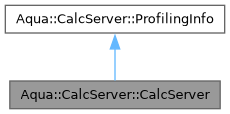
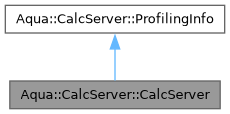
Public Types | |
| enum | cmd_queue { cmd_queue_current , cmd_queue_new , cmd_queue_mpi } |
Public Member Functions | |
| CalcServer (const Aqua::InputOutput::ProblemSetup &sim_data) | |
| Constructor. | |
| ~CalcServer () | |
| Destructor. | |
| void | raiseSIGINT () |
| Raise a SIGINT/SIGTERM signal. | |
| void | update (InputOutput::TimeManager &t_manager) |
| Internal time loop. | |
| void | setup () |
| Setup some additional simulation data. | |
| InputOutput::Variables * | variables () |
| std::vector< std::string > | definitions () const |
| std::vector< Tool * > | tools () const |
| cl_context | context () const |
| cl_platform_id | platform () const |
| cl_device_id | device () const |
| cl_uint | device_addr_bits () const |
| Get the device address bits. | |
| const char * | device_compile_flags () const |
| Get the device compilation flags. | |
| template<typename T> | |
| cl_int | setKernelSizeArg (cl_kernel kernel, cl_uint arg_index, const T arg_value) |
| wrapper to clSetKernelArg to set variables which size depends on the device address bits | |
| cl_command_queue | command_queue (cmd_queue which=cmd_queue::cmd_queue_current) |
| cl_int | finish () const |
| std::vector< cl_event > | all_events () const |
| cl_event | marker () const |
| cl_event | marker (cl_command_queue cmd, std::vector< cl_event > events) const |
| cl_ulong | device_timer_offset () const |
| Get the offset between the device timer and the host one. | |
| cl_event | getUnsortedMem (const std::string var_name, size_t offset, size_t cb, void *ptr) |
| Download a unsorted variable from the device. | |
| const std::string | base_path () const |
| Get the AQUAgpusph root path. | |
| bool | have_3d () const |
| Get if 3 dimensions are considered. | |
| bool | debug_mode () const |
| Report if any tools debug option is enabled. | |
| bool | debug_mode (debug_opts opt) const |
| Report if the tools debug mode option is enabled. | |
| std::tuple< std::vector< InputOutput::Variable * >, std::vector< InputOutput::Variable * > > | eventVars (cl_event event) const |
| Get the variables associated to an event, if any. | |
| Tool * | eventTool (cl_event event) const |
| Get the tool that emitted an event, if any. | |
| template<> | |
| cl_int | setKernelSizeArg (cl_kernel kernel, cl_uint arg_index, const size_t arg_value) |
| Public Member Functions inherited from Aqua::CalcServer::ProfilingInfo | |
| ProfilingInfo (const cl_uint n=N_PROFILING_SNAPSHOTS) | |
| Constructor. | |
| ~ProfilingInfo () | |
| Destructor. | |
| cl_ulong | step () const |
| Get the number of times the tools pack has been executed. | |
| void | sample (cl_ulong step, Tool *tool, std::string name, cl_ulong start, cl_ulong end) |
| Add a new sample to an specific step. | |
| void | sample (cl_ulong step, Tool *tool, Profile *substage, cl_ulong start, cl_ulong end) |
| Add a new sample to an specific step. | |
| std::deque< ProfilingSnapshot > | get () const |
| Get the stored snapshots. | |
Static Public Member Functions | |
| static CalcServer * | singleton () |
| Get –creating it the first time– the logger instance. | |
| static cl_ulong | host_timer () |
| Get the host timer. | |
| Static Public Member Functions inherited from Aqua::CalcServer::ProfilingInfo | |
| static cl_long | delta (const cl_ulong &t, const cl_ulong &t0) |
| Get the delta time. | |
Additional Inherited Members | |
| Protected Member Functions inherited from Aqua::CalcServer::ProfilingInfo | |
| void | newStep () |
| Let the profiler know that a new step of tools execution is about to start. | |
Detailed Description
Entity that perform the main work of the simulation.
In the Aqua::CalcServer::CalcServer a time subloop is performed where the SPH simulation is performed while no output files should be updated.
- Note
- Updating output files require to download data from the server, which due to the low bandwidth asigned is usually a bottleneck, hence letting the Aqua::CalcServer::CalcServer works without interrumptions is the best optimization technique.
- Remarks
- Some output files are managed internally by this class, like the log file, the energy file, pressure sensors file, or bounds file.
Member Enumeration Documentation
◆ cmd_queue
Constructor & Destructor Documentation
◆ CalcServer()
| Aqua::CalcServer::CalcServer::CalcServer | ( | const Aqua::InputOutput::ProblemSetup & | sim_data | ) |
Constructor.
- Parameters
-
sim_data Simulation data read from XML files
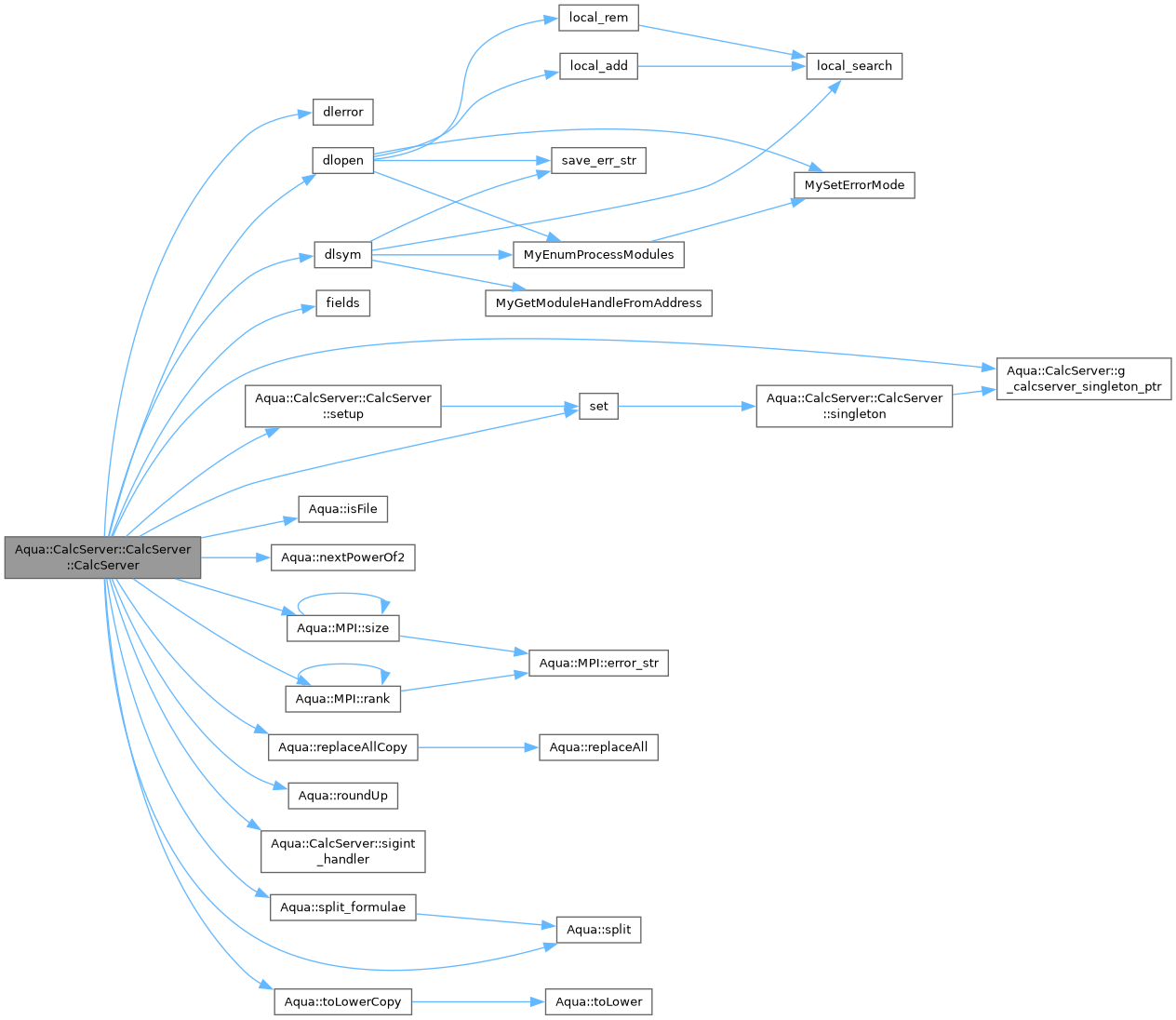
◆ ~CalcServer()
| Aqua::CalcServer::CalcServer::~CalcServer | ( | ) |
Destructor.

Member Function Documentation
◆ all_events()
| std::vector< cl_event > Aqua::CalcServer::CalcServer::all_events | ( | ) | const |
Collect all the events stored on the variables
This includes the user events that shall be set by callbacks. Thus, this function is more powerful than finish() at the time to set a synchronization point. It is slower also.
- Returns
- The full list of events, collected from the variables
◆ base_path()
|
inline |
Get the AQUAgpusph root path.
- Returns
- AQUAgpusph root path
◆ command_queue()
| cl_command_queue Aqua::CalcServer::CalcServer::command_queue | ( | cmd_queue | which = cmd_queue::cmd_queue_current | ) |
Get a command queue
To allow the asynchronous "As-Fast-As-Possible" execution of commands they can be enqueued on different queues. The queues are always reseted when a new time step is executed.
- Parameters
-
which cmd_queue::cmd_queue_current to enqueue the command on the current command queue, cmd_queue::cmd_queue_new to raise a new one where commands can be executed in parallel, cmd_queue::cmd_queue_mpi to get the command queue designed to exchange info with other processes
- Returns
- The command queue @raise std::runtime_error if the command queue cannot be created

◆ context()
|
inline |
Get the active context
- Returns
- OpenCL context
◆ debug_mode() [1/2]
|
inline |
Report if any tools debug option is enabled.
- Returns
- true if any tools debug mode option is enabled, false otherwise
◆ debug_mode() [2/2]
|
inline |
Report if the tools debug mode option is enabled.
- Parameters
-
opt The options to check
- Returns
- true if the tools debug mode option is enabled, false otherwise
◆ definitions()
|
inline |
Get the definitions registered.
- Returns
- List of definitions.
◆ device()
|
inline |
Get the device
- Returns
- OpenCL device
◆ device_addr_bits()
|
inline |
Get the device address bits.
- Returns
- The device address bits (either 32 or 64)
◆ device_compile_flags()
|
inline |
Get the device compilation flags.
- Returns
- The device compilation flags
◆ device_timer_offset()
|
inline |
Get the offset between the device timer and the host one.
- Returns
- The time offset, in nanoseconds
◆ eventTool()
| Tool * Aqua::CalcServer::CalcServer::eventTool | ( | cl_event | event | ) | const |
Get the tool that emitted an event, if any.
- Returns
- The tool that created the event. Null if no tool is found
◆ eventVars()
| std::tuple< std::vector< InputOutput::Variable * >, std::vector< InputOutput::Variable * > > Aqua::CalcServer::CalcServer::eventVars | ( | cl_event | event | ) | const |
Get the variables associated to an event, if any.
- Returns
- The list of variables that depends on the event, both for writing and reading
◆ finish()
|
inline |
Call clFinish() on top of all known command queues
- Returns
- CL_SUCCESS if clFinish() is correctly called on all queues, an error code otherwise
◆ getUnsortedMem()
| cl_event Aqua::CalcServer::CalcServer::getUnsortedMem | ( | const std::string | var_name, |
| size_t | offset, | ||
| size_t | cb, | ||
| void * | ptr ) |
Download a unsorted variable from the device.
- Parameters
-
var_name Variable to unsort and download. offset The offset in bytes in the memory object to read from. cb The size in bytes of data being downloaded. ptr The host memory where the data should be copied
- Returns
- The data download event, NULL if errors are detected.
- Note
- The caller must wait for the events (clWaitForEvents) before accessing the downloaded data.
- Remarks
- The caller must call clReleaseEvent to destroy the event. Otherwise a memory leak can be expected.
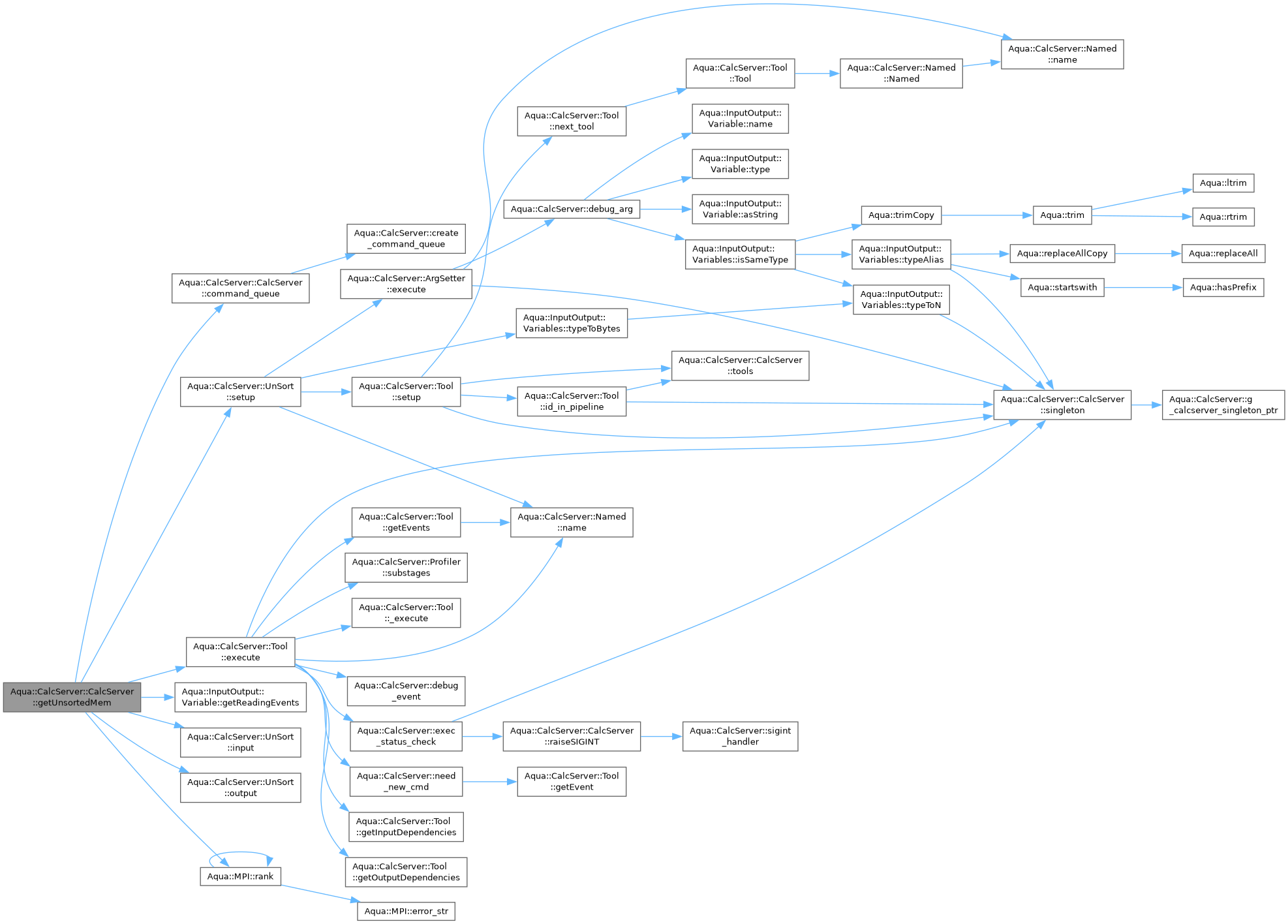
◆ have_3d()
|
inline |
Get if 3 dimensions are considered.
- Returns
- true if a 3D simulation is considered, false if it is conversely a 2D simulation
◆ host_timer()
|
inlinestatic |
Get the host timer.
- Returns
- The host timer in nanoseconds
◆ marker() [1/2]
| cl_event Aqua::CalcServer::CalcServer::marker | ( | ) | const |
Create a marker to be set as completed when all the enqued commnands on all the command queues are finished.
- Returns
- the master event

◆ marker() [2/2]
| cl_event Aqua::CalcServer::CalcServer::marker | ( | cl_command_queue | cmd, |
| std::vector< cl_event > | events ) const |
Wrapper over clEnqueueMarkerWithWaitList()
- Note
- 2024/05/24 NVIDIA's platform clEnqueueMarkerWithWaitList() is broken. This method is circumventing it by a less performant method
- Returns
- The marker event

◆ platform()
|
inline |
Get the platform
- Returns
- OpenCL platform
◆ raiseSIGINT()
| void Aqua::CalcServer::CalcServer::raiseSIGINT | ( | ) |
Raise a SIGINT/SIGTERM signal.
This can be useful for instance to asynchronously interrupt the execution after detecting errors
- Note
- This function will never force the execution termination. If the signal has been already rised somewhere else, this function will just gently wait for the execution to be finished

◆ setKernelSizeArg() [1/2]
| cl_int Aqua::CalcServer::CalcServer::setKernelSizeArg | ( | cl_kernel | kernel, |
| cl_uint | arg_index, | ||
| const size_t | arg_value ) |

◆ setKernelSizeArg() [2/2]
| cl_int Aqua::CalcServer::CalcServer::setKernelSizeArg | ( | cl_kernel | kernel, |
| cl_uint | arg_index, | ||
| const T | arg_value ) |
wrapper to clSetKernelArg to set variables which size depends on the device address bits
- Parameters
-
kernel OpenCL kernel object arg_index is the argument index arg_value is a pointer to data
◆ setup()
| void Aqua::CalcServer::CalcServer::setup | ( | ) |
Setup some additional simulation data.
Even thought this work is associated with the constructor CalcServer(), when something may fail it is preferable to let it to a separated method that could report errors, allowing the program to deal with them.

◆ singleton()
|
static |
Get –creating it the first time– the logger instance.
Just one logger can simultaneously exist
- Returns
- The logger

◆ tools()
|
inline |
Get the tools registered.
- Returns
- List of tools.
◆ update()
| void Aqua::CalcServer::CalcServer::update | ( | InputOutput::TimeManager & | t_manager | ) |
Internal time loop.
Calculation server will be iterating while no output files should be updated (or even the simulation is finished).
- Parameters
-
t_manager Time manager to let the calculation server when shall stop the internal loop.
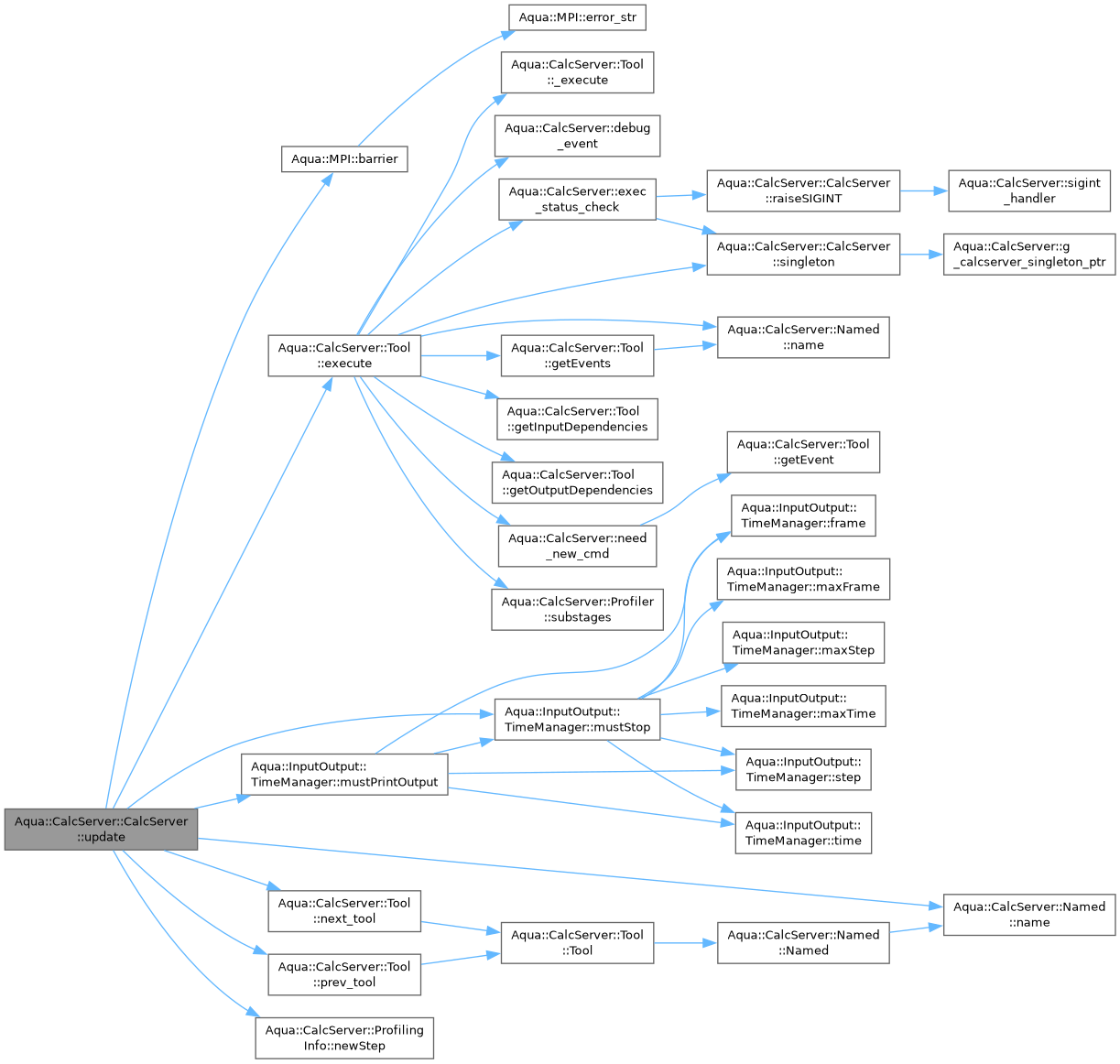
◆ variables()
|
inline |
Get the variables manager
- Returns
- Variables manager
The documentation for this class was generated from the following files:
- /home/pepe/SPH/Code/aquagpusph/aquagpusph/CalcServer/CalcServer.hpp
- /home/pepe/SPH/Code/aquagpusph/aquagpusph/CalcServer/CalcServer.cpp
Generated by